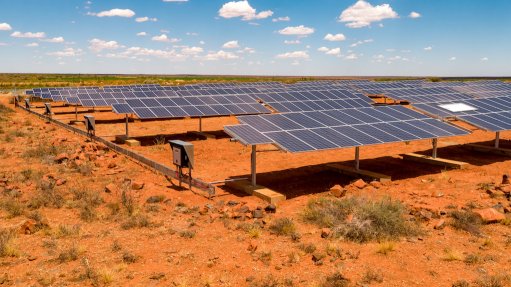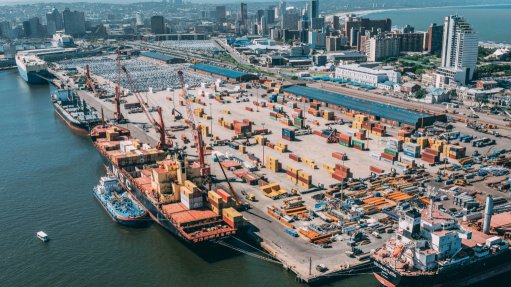How ESG in construction can transform SA’s building sector
This article has been supplied by the author and has not been written or solicited by Creamer Media. It may be available only for a limited time on this website.
Morag Evans - CEO of Databuild
The growing importance of Environmental, Social, and Governance (ESG) criteria is having a significant impact on how building projects are planned, executed, and managed in South Africa. If anything, it is reshaping the construction landscape when it comes to promoting sustainable development and improving social outcomes.
Companies should think of ESG as the three main areas that they are expected to report in. According to Deloitte, the goal of ESG is to capture all the non-financial risks and opportunities inherent to a company's day to day activities.
In recent years, there has been a significant shift towards construction companies using green building materials. These sustainable materials reduce the environmental footprint of construction projects. An example of such a project can be found in the Sandbag Houses in Cape Town. These homes substitute brick-and-mortar with sandbags to contribute to eco-friendly construction and affordable housing in the region.
Furthermore, energy efficiency designs are also becoming standard practice. Using modern technologies like solar panels, energy-efficient HVAC systems, and LED lighting, construction companies can significantly reduce the operational costs of buildings as well as their environmental impact.
Of course, waste management strategies are also integral to reducing the environmental impact of construction. Recycling and reusing materials, along with proper disposal methods, help mitigate the impact of construction waste on the environment.
For a water-scarce country like South Africa, adopting advanced water conservation measures is essential in construction. Techniques such as rainwater harvesting, greywater recycling, and using low-flow fixtures have become common in construction projects to ensure sustainable water use.
Social considerations
There is little arguing about the significant impact large construction projects can have on local communities. This is why engagement with all relevant local stakeholders is essential. In this way, construction companies can account for the concerns of communities and foster positive relationships. As part of this, creating job opportunities is a massive positive benefit. This not only supports the economy but helps develop local skills and expertise.
Another benefit of working closely with communities is the potential to promote social equity. This helps ensure that all community members benefit from construction projects. For example, long-term projects can entail providing access to affordable housing, and essential services, and fostering inclusive development.
Worker safety is another critical consideration when it comes to an ESG strategy. Complying with stringent health and safety regulations and providing ongoing training ensures that construction sites are safe for workers, reducing the risk of accidents and injuries.
Governance framework
The construction industry in South Africa is also very tightly regulated. Adhering to legal requirements and maintaining transparency in operations is essential for good governance. Construction companies must comply with environmental regulations, labour laws, and ethical standards to build trust with stakeholders.
Implementing ethical practices across all operations ensures that construction companies maintain high standards of integrity. Examples of this include adopting fair labour practices, responsible sourcing of materials, and ethical business conduct.
Business benefits
Construction companies that prioritise ESG principles often enjoy an enhanced reputation. This can result in increased business opportunities as clients and investors are more likely to partner with organisations that demonstrate a commitment to sustainability and social responsibility.
Additionally, integrating ESG criteria into construction projects helps mitigate risks. By proactively addressing environmental and social issues, companies can avoid potential legal and regulatory challenges and ensure smoother project execution.
Employing ESG principles can also improve financial performance. Sustainable practices often lead to cost savings through energy efficiency and waste reduction. Additionally, projects that prioritise ESG criteria may attract investment from socially responsible investors, further boosting financial outcomes.
By embracing ESG principles, the construction industry in South Africa can achieve sustainable development, improve social outcomes, and ensure compliance with corporate governance requirements. These efforts not only benefit the environment and society but also enhance the reputation, risk management, and financial performance of construction companies.
Comments
Press Office
Announcements
What's On
Subscribe to improve your user experience...
Option 1 (equivalent of R125 a month):
Receive a weekly copy of Creamer Media's Engineering News & Mining Weekly magazine
(print copy for those in South Africa and e-magazine for those outside of South Africa)
Receive daily email newsletters
Access to full search results
Access archive of magazine back copies
Access to Projects in Progress
Access to ONE Research Report of your choice in PDF format
Option 2 (equivalent of R375 a month):
All benefits from Option 1
PLUS
Access to Creamer Media's Research Channel Africa for ALL Research Reports, in PDF format, on various industrial and mining sectors
including Electricity; Water; Energy Transition; Hydrogen; Roads, Rail and Ports; Coal; Gold; Platinum; Battery Metals; etc.
Already a subscriber?
Forgotten your password?
Receive weekly copy of Creamer Media's Engineering News & Mining Weekly magazine (print copy for those in South Africa and e-magazine for those outside of South Africa)
➕
Recieve daily email newsletters
➕
Access to full search results
➕
Access archive of magazine back copies
➕
Access to Projects in Progress
➕
Access to ONE Research Report of your choice in PDF format
RESEARCH CHANNEL AFRICA
R4500 (equivalent of R375 a month)
SUBSCRIBEAll benefits from Option 1
➕
Access to Creamer Media's Research Channel Africa for ALL Research Reports on various industrial and mining sectors, in PDF format, including on:
Electricity
➕
Water
➕
Energy Transition
➕
Hydrogen
➕
Roads, Rail and Ports
➕
Coal
➕
Gold
➕
Platinum
➕
Battery Metals
➕
etc.
Receive all benefits from Option 1 or Option 2 delivered to numerous people at your company
➕
Multiple User names and Passwords for simultaneous log-ins
➕
Intranet integration access to all in your organisation




















